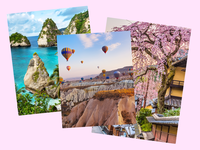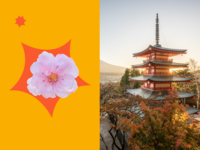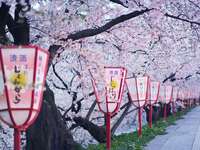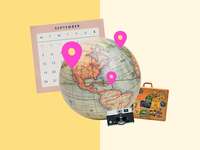Your Guide to a Kenya Honeymoon and Classic African Safari
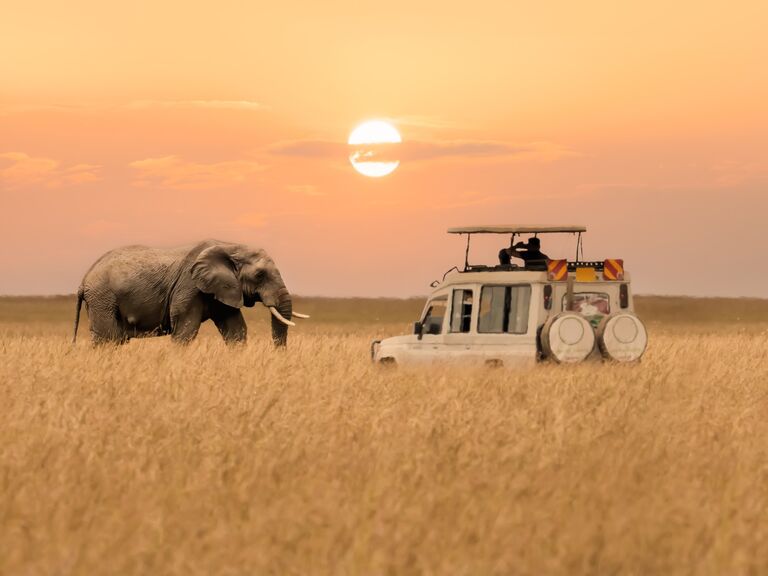

For adventurous couples who want to experience a classic African safari, a Kenya honeymoon is hard to beat. This East African country is one of the best honeymoon spots in the world and a romantic place to visit thanks to its scenic landscapes, diverse wildlife, and warm hospitality. For many, witnessing the Great Migration in the Maasai Mara is a once-in-a-lifetime opportunity, but rest assured that even if you travel to Kenya during the shoulder seasons, you'll have plenty of chances to spot lions, elephants, giraffes, zebras, and other wildlife on safari.
If you have more than a week, you might want to add a few days in Nairobi, Kenya's bustling capital, or perhaps venture to the coast or Lamu Island. Thanks to its history as an Arab trading post, the island has a rich heritage and a unique culture. Considering the amount of time it takes to get to Kenya from the U.S. (anywhere from 13 to 24 hours), you should plan to spend at least a week there. With two weeks, you can combine a bit of time in Nairobi with a safari in the Maasai Mara and some beach time on Lamu Island. Read on for everything you need to know about how to plan a Kenya honeymoon.
Kenya Honeymoon Tips in this Article:
- Expert Kenya Honeymoon Planning Advice
- The Best Times to Honeymoon in Kenya
- Kenya Honeymoon Travel Tips for Couples
- The Best Kenya Honeymoon Resorts and Hotels
- Kenya Honeymoon Itinerary Ideas
- What to Pack for a Kenya Honeymoon
Expert Kenya Honeymoon Planning Advice
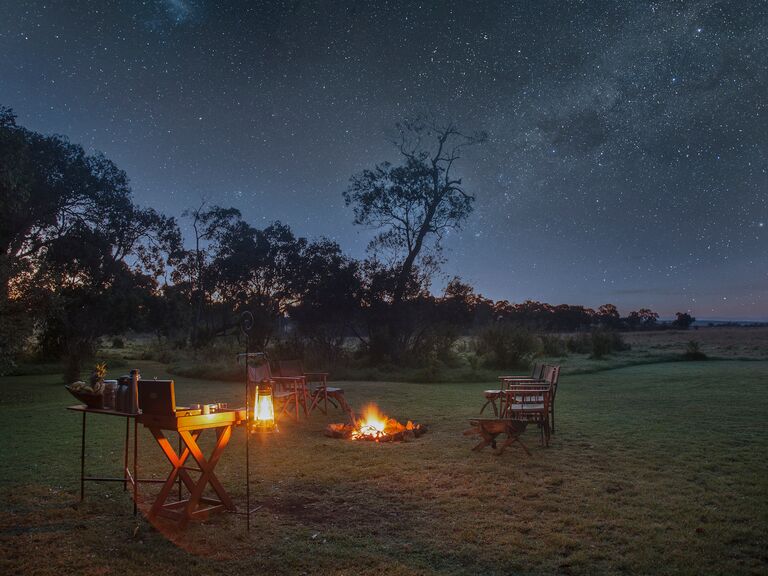
Pros of a Honeymoon in Kenya
A trip to Kenya is the kind of bucket list trip that's meant for honeymoons. It's a popular destination for couples going on safari for the first time—and with good reason. Safaris are an excellent bonding experience. You'll spend most of your time out in nature, away from crowded cities, and the days tend to be structured around game drives, so there's very little planning required on your part.
"After planning a wedding, you don't need to wake up every day of your honeymoon and decide what to do and where you want to eat. The planning will be done—you just have to jump on board," says Elizabeth Gordon, co-founder of Extraordinary Journeys, a leading tour company that specializes in Africa. According to Gordon, many camps also offer honeymoon discounts if you travel within six months of your wedding. Another pro: most safaris are all-inclusive, with your meals and (in some cases) alcoholic beverages, daily game drives, and (some but not all) other activities factored into the room rate.
Cons of a Honeymoon in Kenya
Days on safari usually start at the crack of dawn (5 am in some cases) because that's when the animals are out and about, so if your idea of the perfect honeymoon involves sleeping in everyday, a safari might not be the best choice for you. In order to reach most safari camps and lodges, you'll need to fly into Nairobi and then take a small Cessna (sometimes called a bush plane), so if you or your spouse is afraid of flying, you might want to think twice about going on safari. Most camps are not fenced off, so precautions must be taken (after dark, you must always be accompanied by a staff member). Though you're not likely to come face to face with any wild animals, you might hear lions or leopards roaring at night.
The Best Times to Honeymoon in Kenya
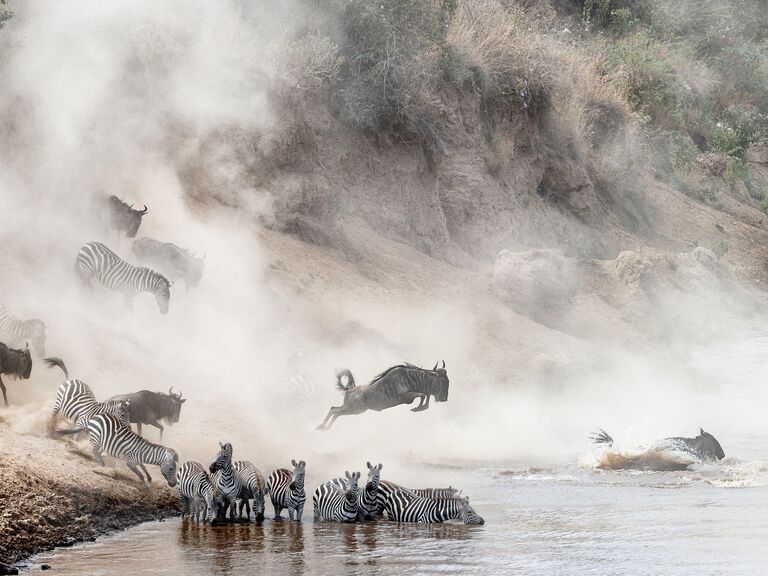
The dry seasons (June through October and December through February) are typically recommended for travel to Kenya. July, August, and September are the months when you're most likely to witness the Great Migration. However, as these periods are peak season, you can expect to find higher prices and more people. During the wet seasons (mid-March through May and November), you're likely to get some rain, but on the other hand, the landscape will be green and lush and you'll find lower rates and fewer people around.
Kenya Honeymoon Travel Tips for Couples
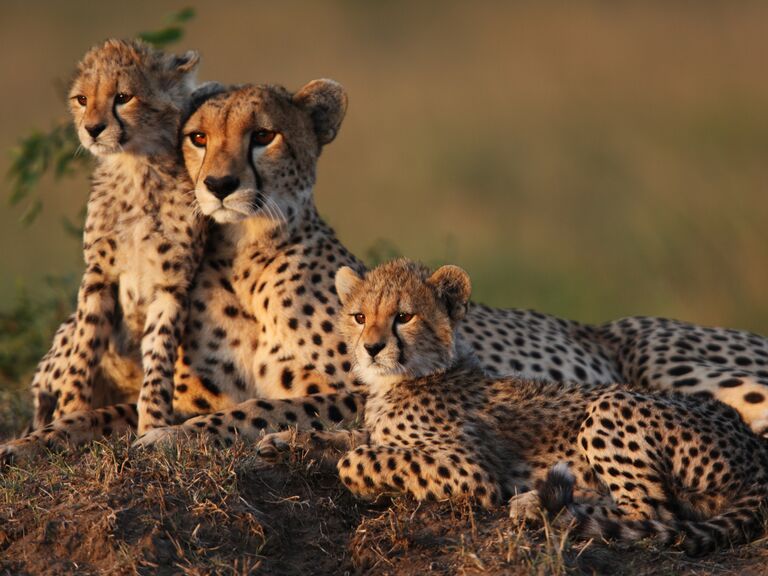
It's generally quite safe to travel to Kenya, but while on safari it's crucial to abide by the camp's safety precautions. On game drives, it's imperative that you say inside the vehicle unless your guide tells you it's safe to get out. And after dark, you must be accompanied by a staff member with a flashlight and usually a firearm in case there are predatory animals around.
There are some direct flights to Nairobi from the U.S., but you're likely to have a layover in Europe or the UAE. Bigger cities like New York sometimes offer direct flights to and from the country. And once you arrive in Nairobi, that's just the starting point. To get to the safari camps and lodges, you'll most likely have to take a bush plane.
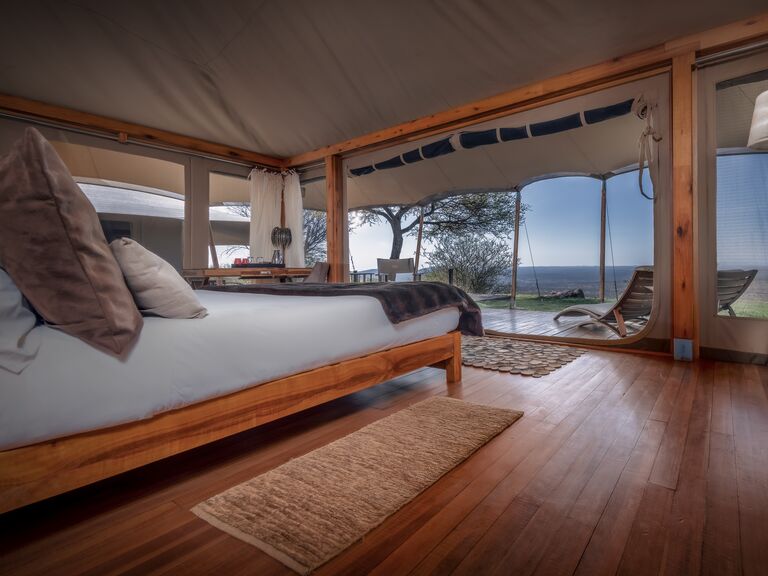
Before departing for Kenya, you'll need vaccines for yellow fever, cholera, typhoid, and possibly other diseases. Depending on where you're going, you might need to take medication to prevent malaria. It's important to speak with your healthcare provider before your trip. You'll also need to apply for an e-visa in advance in order to enter the country.
Once you get there, you'll find that Kenyans speak excellent English (the country is a former British colony). The official currency is the Kenyan Shilling, but when tipping, USD is generally accepted. Kenya is on East Africa Time, which is eight hours ahead of EST.
The main reason to visit Kenya is to go on safari, but you can also experience urban life in Nairobi and relax on the beaches in places like Lamu Island. There aren't restaurants out in the bush, so you'll be eating your meals at the lodge or camp. High-end safari lodges and camps usually have their own guides and vehicles, but if you plan to visit multiple locations, it's best to work with a reputable safari operator like Extraordinary Journeys. They will handle all the details of your itinerary, including lodging and activities as well as in country transfers.
Pro tip: Invite a honeymoon planning expert to join your vendor team. Browse travel agents near you on The Knot Marketplace for Kenya honeymoon expertise, reviews, testimonials and more.
The Best Kenya Honeymoon Resorts and Hotels
Angama Mara
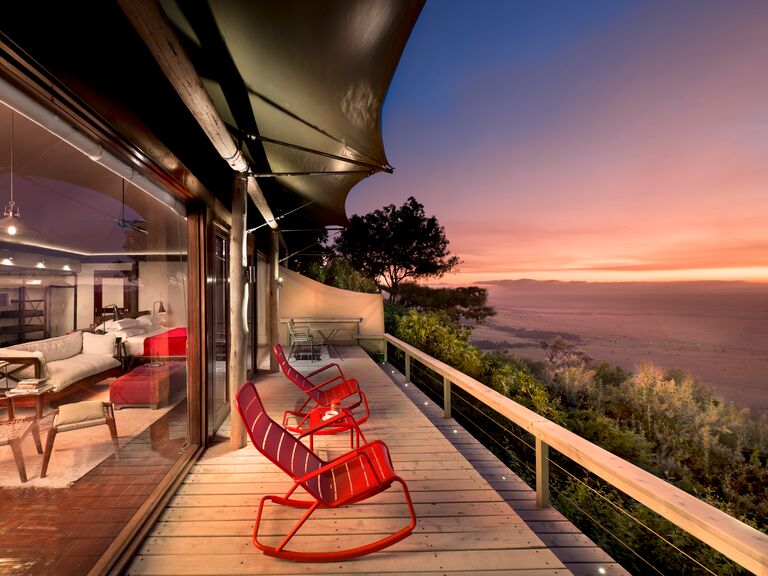
Created by safari veterans, Nicky Fitzergald and her late husband Steve, this luxurious lodge boasts the most spectacular setting in the Maasai Mara, perched on an escarpment overlooking the Great Rift Valley. Thirty tented suites radiate out from the central pavilion, where guests gather around the fire to regale each other with stories about the day's adventures. The sleek, modern design includes many made in Africa touches. Staff organize everything from game drives to picnics in a secluded spot where some scenes in Out of Africa were filmed.
The Mara Triangle Conservancy, Maasai Mara Game Reserve, Lolgorien, Kenya
5.0 Star Rating | Read Reviews
Basecamp Masai Mara
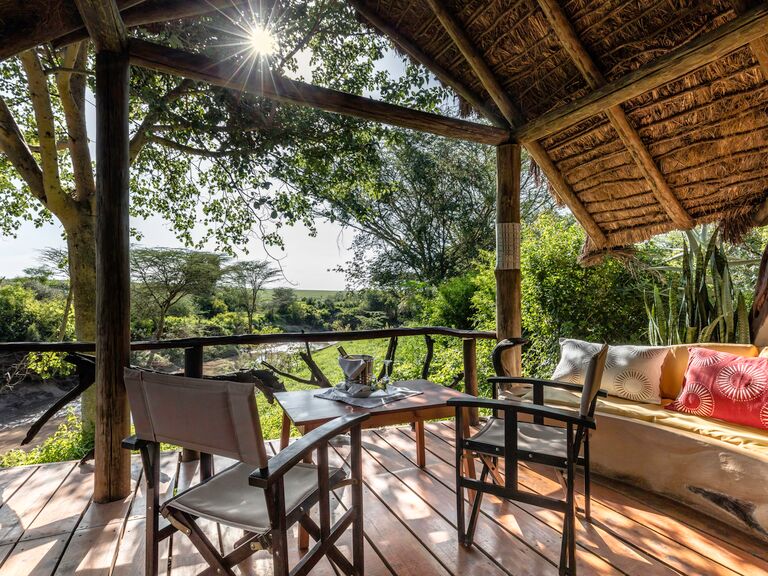
Situated along the banks of the Talek River, this tented camp by Basecamp Explorer has direct views of the Maasai Mara National Reserve. Founded by Svein Wilhelmsen and Maasai chief Ole Taek, the company is involved in various conservation projects, which range from planting trees to empowering Maasai women by giving them a chance to sell their beaded handcrafts. Basecamp Masai Mara's 17 tents have solar-heated showers and bio-flush toilets and the camp has won awards for eco-tourism.
Talek, C14, Maasai Mara National Reserve, Kenya
5.0 Star Rating | Read Reviews
Elewana Loisaba Tented Camp & Star Beds
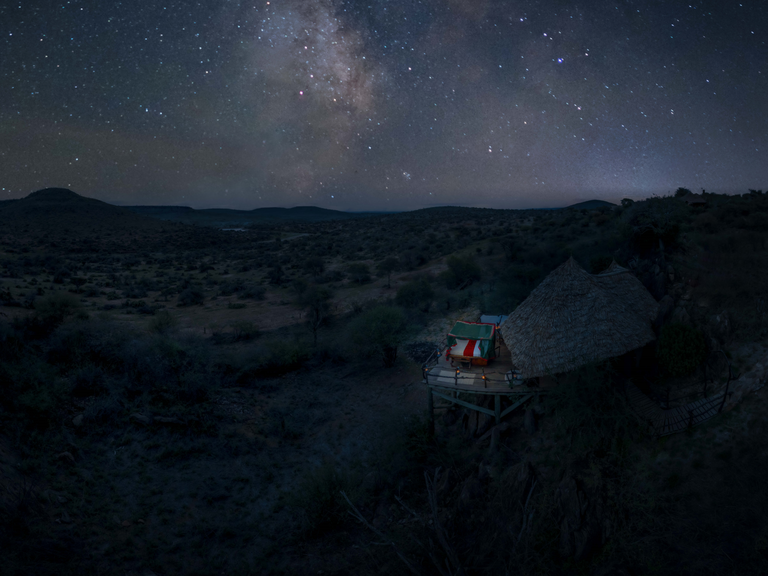
Gordon recommends this five-star tented camp in the Loisaba Conservancy, a 57,000-acre wildlife conservancy in Laikipia, in northern Kenya. Set on a high plateau, Loisaba is home to Kenya's second-largest elephant population as well as northern species like Grevy's zebra and reticulated giraffe. The honeymoon experience includes a private candle-lit dinner under the stars, or you can go one step further and sleep under the stars in one of Loisaba's Star Beds. Guests also love the in-room massages and visits to a Samburu village.
Loisaba Conservancy, Kirimon, Kenya
5.0 Star Rating | Read Reviews
Leopard Hill
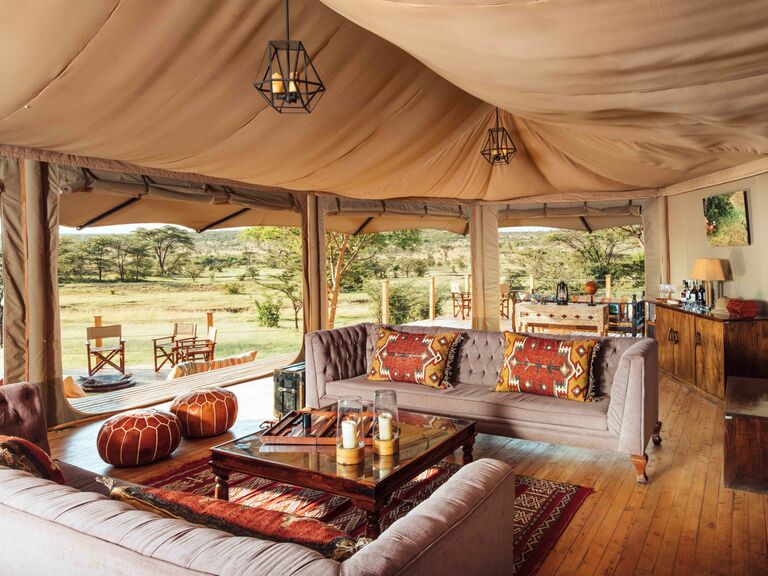
One of Basecamp Explorer's six camps in the Maasai Mara, Leopard Hill has unique round tents inspired by Maasai homes called Manayattas. They have retractable roofs, so at the press of a button, you can reveal the starry night sky. The six tents are located in a secluded valley in the Naboisho Conservancy in the shadow of a 'Double Fig Tree' so-called because when lightning struck the tree in the 1950s, it split in two. Guests praise the knowledgeable guides as well as the staff at the communal dining area for catering to specific dietary needs and preferences.
H7V5+XMX, Mara Naboisho, Mara Naboisho Conservancy, Kenya
5.0 Star Rating | Read Reviews
Mara Bushtops
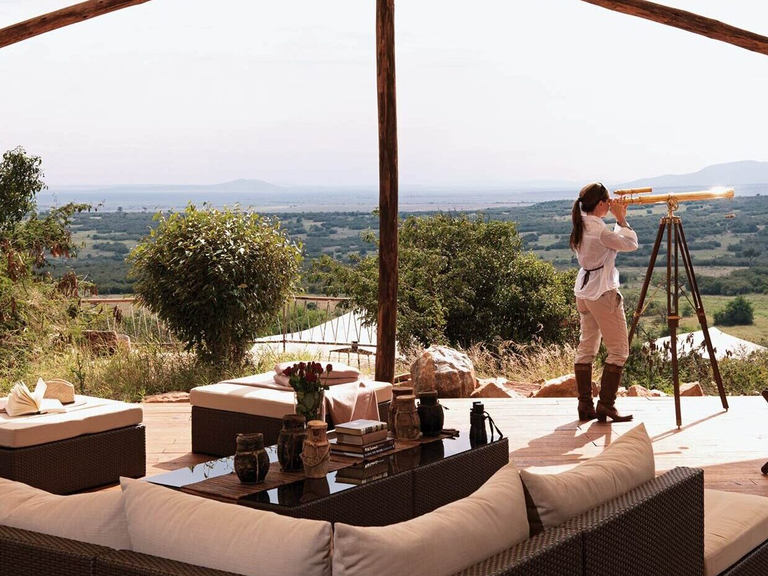
The Bushtops company has just three intimate five-star safari camps in East Africa (this one and two in Tanzania) and guests rave about the friendly, attentive staff who go out of their way to make them feel welcome. The 12 luxury tents are outfitted with all the amenities you'd expect at a five-star hotel and the spa is praised as one of Africa's best. The camp is located in a private conservancy, which means that unlike at camps set inside national parks, guests have the possibility of off-roading and going on night drives.
Land Parcel No. 4, Siana, Kenya
5.0 Star Rating | Read Reviews
Kenya Honeymoon Itinerary Ideas
Spot the Big Five on Safari
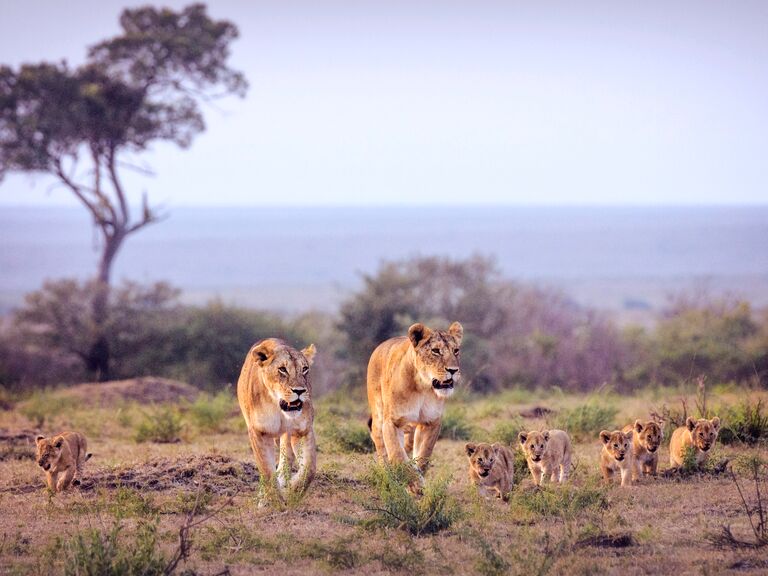
Do you know what the big five are? Hint: these are the most awe-inspiring animals you can see on safari—and they were once considered the most prized animals for hunters because of how challenging and dangerous it is to hunt them. They are lions, leopards, elephants, buffalo, and rhinos. On daily game drives, your guide will help you spot them, in addition to plenty of other wildlife, including zebras, giraffes, antelopes, cheetahs, warthogs, hyenas, many species of birds, and maybe even wild dogs. Many safari camps have binoculars for you to borrow, but you might want to bring your own just in case.
Enjoy Nightly Sundowners
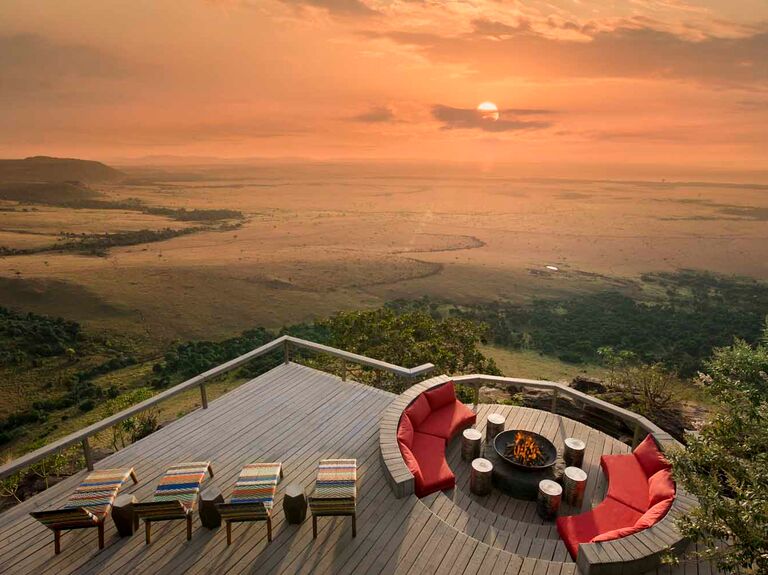
Sundowners are a cherished ritual at the end of the day's game drive. You might return to camp to enjoy a sundowner by the fire or your guide might stop at a scenic spot and set up a makeshift bar on the hood of the vehicle or bring you to a magical place where the camp's team has set up a bar in the middle of the bush. It's your chance to enjoy a classic Gin & Tonic, wine, or beer with some salty snacks and take in the beauty of the African landscape as you watch the sun start to set over the horizon.
Take a Hot Air Balloon Ride
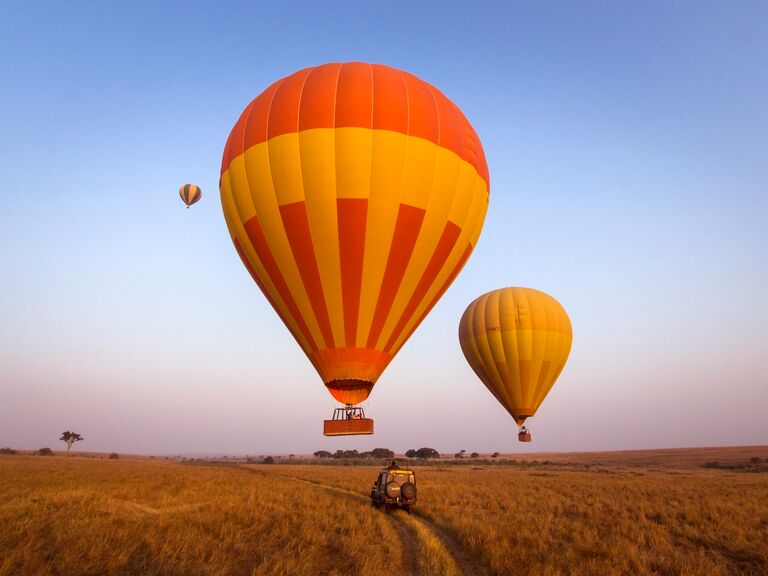
It's worth the pre-dawn wake-up call for this once-in-a-lifetime experience, which your safari operator or camp can arrange for you. You'll warm up with hot coffee or tea and watch the balloon slowly inflate before you hop into the basket and rise high above the treetops, floating wherever the wind takes you as you gaze down at the savannah and spot animals from up high. In keeping with tradition, hot air balloon rides usually end with a Champagne toast and breakfast in the bush. It's definitely one of the most memorable experiences you can have on safari.
Learn About Maasai Culture
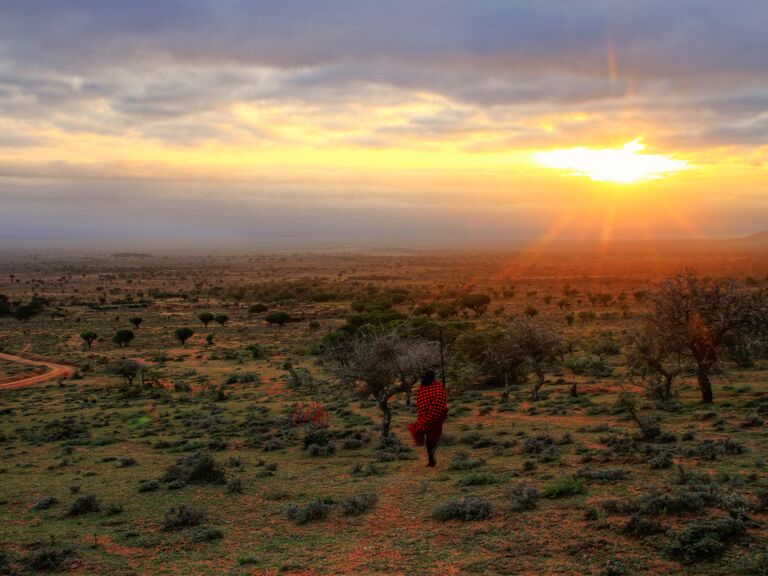
The Maasai are one of more than 50 recognized native tribes in Kenya and remain one of the few that has held onto their traditions and lifestyle. A semi-nomadic tribe of herders, they're known for their bravery and can be easily recognized by their bright red robes. Many camps work with Maasai guides and some organize visits to Maasai villages or other ways for guests to interact with the Maasai. Angama Mara, for example, gives guests a chance to watch Maasai jumping contests and go on walking safaris with a naturalist Maasai guide.
Explore Nairobi
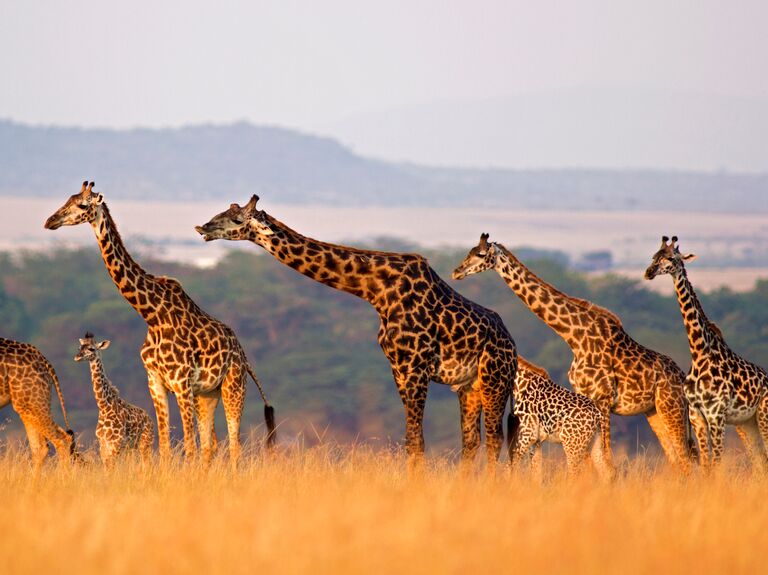
Most people use Nairobi as merely a jumping-off point to head out to the bush, but Gordon recommends spending a couple of nights there at the start of your trip to ease into things. In Karen, the neighborhood named after Karen Blixen, who wrote Out of Africa, you can feed giraffes at the Giraffe Center and Giraffe Center Nature Trail, shop for artisan goods at Utumaduni Shops, which brings together a variety of local vendors, and admire contemporary African sculptures at MatBronze Art Gallery, Kenya's first bronze foundry.
Pro tip: Add a Kenya honeymoon fund to your gift registry so that loved ones can gift you one of these memorable couples activities. Don't forget to post some amazing honeymoon photos to your wedding website and social feed for your guests to see.
What to Pack for a Kenya Honeymoon
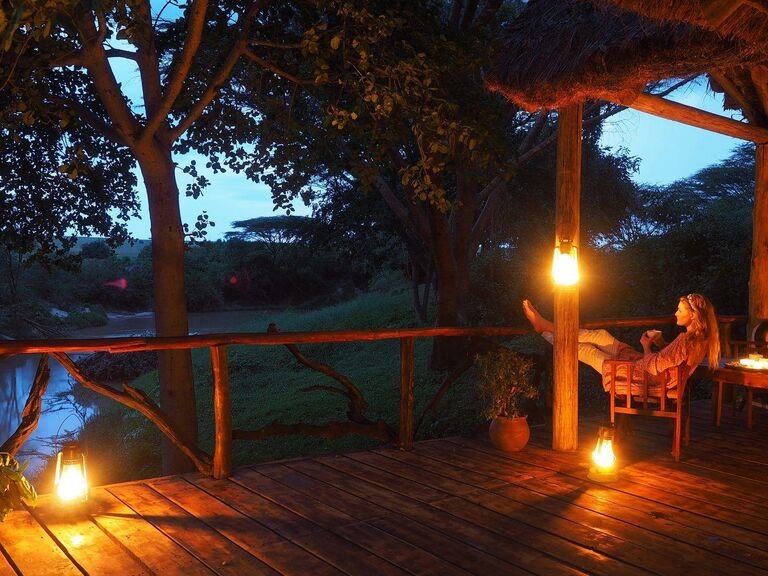
When going on a Kenya safari, you'll be limited to 33 pounds of luggage per person in soft-sided bags, so you'll have to pack light. "You need less than you think!" Gordon says. "You'll be able to do laundry everywhere, you don't need fancy clothes at dinner, you don't need to wear an all khaki and olive wardrobe all the time, and you don't need clunky hiking boots unless you're going somewhere with more serious focus on walking."
Do bring a warm jacket for early mornings and evenings, when it can be quite chilly. Most safari camps offer blankets when the chill sets in too. Prepare sunscreen, a hat, as well as other sun protection products and pieces as Kenya is on the equator. Other than that, focus on comfort. For more honeymoon packing tips, explore our guide.

